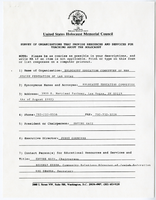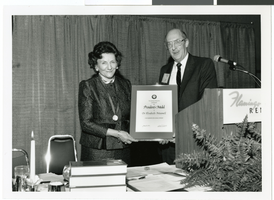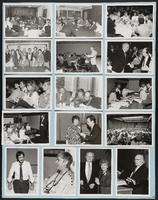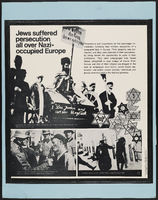Search the Special Collections and Archives Portal
Search Results
Holocaust Education and Curriculum correspondence; articles about the Holocaust; Clark County School District Professional Development Education program materials relating to Holocaust education conference including the topics: "One Survivor Remembers," "Art of the Holocaust," and "Rescue and Resistance,"; proclamation and correspondence about the Holocaust Remembrance Week in Nevada, 1984 to 2015
Level of Description
Archival Collection
Collection Name: Sperling Kronberg Mack Holocaust Resource Center Records
Box/Folder: Box 07
Archival Component

Survey from the United States Holocaust Memorial Council, August 1992
Date
Archival Collection
Description
United States Holocaust Memorial Council survey of organizations that provide resources and services for teaching about the Holocaust, filled out by the Holocaust Education Committee of the Jewish Federation of Las Vegas.
Text

Photographs of the Governor's Conference on "The Universal Implications of the Holocaust," April 23 - 24, 1991
Date
Archival Collection
Description
Various photographs of the Governor's Conference on "The Universal Implications of the Holocaust."
Image
Governor's Advisory Council (GAC) correspondence, event planning documents, newspaper clippings, and administrative records, 1979 to 2018
Level of Description
Archival Collection
Collection Name: Sperling Kronberg Mack Holocaust Resource Center Records
Box/Folder: Box 15, Box 16, Box 17, Box 18, Box 19, Box 20, Box 21, Box 22, Box 23, Box 24
Archival Component
Robinson, Lyn, 1978-
Lyn Robinson was born January 16, 1978 in Florida. She moved to Las Vegas, Nevada in 1999 and became a student at the University of Nevada, Las Vegas (UNLV). She was an art major with a concentration on photography. Robinson also had a deep appreciation of the horror of the Holocaust and what the survivors she would take photos of had endured. This began a two year project, during which she took photos of over sixty survivors. Robinson’s images were displayed at the Sperling Kronberg Mack Holocaust Resource Center.
Person

Transcript of interview with Marcy and Jack Simon by Barbara Tabach, May 16, 2018
Date
Archival Collection
Description
It was 1964 when Jack Simon met Marcy Stiel at a mutual friend’s wedding. Smitten from the beginning, the couple married shortly thereafter. Thus began their loving partnership that has flourished in business, community involvement, and most importantly in raising their two sons, Ron and Steven. The Simon’s can be a modest power couple. However, they are clearly capable of making things happen. When they first married, Jack was a California electrical contractor and homebuilder and Marcy became his business administrator. The Simons through their Electrical Company, Expo-Tech Electrical & Plumbing Services, Inc. won the contract to provide all of the electrical services for the entire 1984 Los Angeles Olympics, encompassing (26) twenty six venues located in California spanning from San Diego to Stanford University. The trajectory of the business was extraordinary, establishing twelve offices nationwide to provide temporary electrical and plumbing services for conventions and special events. Expo-Tech was eventually bought by industry giant GES. Their success was due in large part to Jack’s technical knowledge and Marcy’s administrative and marketing skills. With entrepreneurial zest, and over the period of eleven years, the couple found their way into the ownership of four local casinos in Elko and Wendover Nevada. Marcy was one of the first women in Nevada to hold multiple gaming licenses. In total, she held four Unrestricted Gaming Licenses. The Simons hosted Passover Seders for the Elko Jewish Community during their ownership of the casinos. In 2004, Marcy and Jack sold the four casino operations. Since moving to Nevada in 1994, the couple has made a warm and lasting impression, being generous in their focus for the well-being of the Jewish community. They are among those that actively paved the way for SB26, which outlaws government bodies from conducting business with companies that boycott Israel. They continue to be tireless advocates and philanthropists in Jewish organizations of Las Vegas and Nevada.
Text
Henry Kronberg oral history interview
Identifier
Abstract
Oral history interview with Henry Kronberg conducted by Barbara Tabach on February 26, 2015 for the Southern Nevada Jewish Heritage Project. In this interview Kronberg talks about his childhood in Germany and Poland, his experience being imprisoned by the Gestapo, and being transported to a concentration camp. He talks about surviving the Holocaust and meeting his wife. He discusses being reunited with his sister in Las Vegas, Nevada after decades of searching. Kronberg discusses purchasing Stoney's, a loan and pawn shop, anti-Semitism, and water resources in Southern Nevada.
Archival Collection

Transcript of interview with Henry Kronberg by Barbara Tabach, February 26, 2015 and April 13, 2015
Date
Archival Collection
Description
Interview with Henry Kronberg by Barbara Tabach in two sessions, February 26 and April 13, 2015. In the first session Kronberg talks about his childhood in Germany and Poland and his experience being imprisoned by the Gestapo, and transported to a concentration camp. He survived the Holocaust and met his wife, and they moved to the United States in 1946. He discusses being reunited with his sister in Las Vegas after decades of searching, and moved his family to Las Vegas in 1962. Kronberg talks about becoming involved with Jewish life here, and his wife, Lillian's involvement at Temple Beth Sholom. In the second session, Kronberg discusses purchasing Stoney's, a loan and pawn shop, including some of the clientele and merchandise. He also discusses other social and environmental concerns like anti-Semitism and water resources in Southern Nevada.
Henry Kronberg was born in 1920 and spent his early childhood in a town on the border of Poland and Germany, about 40 miles from Krakow. For years he felt uncomfortable telling his story of surviving the Nazi concentration camps of World War II. Today his name is linked to the Sperling Kronberg Mack Holocaust Resource Center in Las Vegas. And in his soft-spoken manner, Henry recalls his ordeal of loss of family and survival during this most heinous of situations through backbreaking labor and ingenuity. At the end of the war, Henry met the love of his life, Lillian, also a survivor. The two married in 1946 in Frankfurt and immigrated to New Jersey where she had relatives. He describes their difficulties and the various jobs he held until becoming an excellent baker. Then in 1962 an interesting choice took him to a bar mitzvah in Canada. While there the dinner conversation lead him to a great discovery?his sister Lala had survived and was living in Las Vegas. Soon he moved his wife and daughter to Las Vegas. His first foray into business was with his brother-in-law. However, soon it was important to be independent and to control his own destiny. He purchased a going concern, Stoney's Pawn Shop, from Dr. Alexander Coblentz, one of the city's first doctors. He became the fourth owner of Stoney's and operated it until selling it to Steven Mack in 1998. Henry and his wife were active in the Jewish community. They joined Temple Beth Sholom and became fast friends with many of the early leaders of Las Vegas and became a respected member of the secular and Jewish communities.
Text


